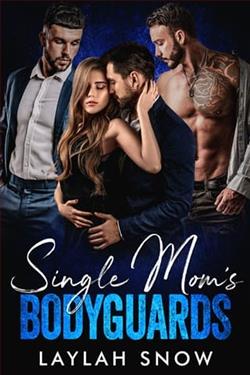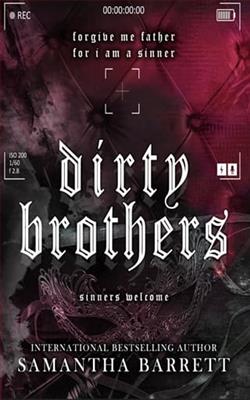Page 11 of Thick and Thin
Soon, the doctor arrived in the room—a tall, fit man probably about my father’s age. His light brown hair was trimmed short, perhaps to hide all the gray strands infiltrating the bunch, and the corner of his eyes had lines. I could feel warmth and compassion from him, even before he offered his hand to shake my father’s, introducing himself as Dr. North. When he turned his focus to me, I told him my name and who I was.
After discussing much of my father’s health history with him and glancing at the computer on occasion, Dr. North said, “You are an excellent candidate for this treatment.” Finally, he rotated the monitor on the wall so we could see it, going over my father’s most recent MRI. I’d seen them before, the white areas—“lesions,” they called them. Fortunately, the doctor used plain language to explain much of the procedure and what they hoped to accomplish.
“If you’re like most people with this treatment, you’ll experience fewer relapses—and, after a few treatments, we’ll have you get another MRI. Chances are your lesions will be reduced.”
I had never heard this promise before—but I knew what it all meant. My dad’s eyes filled with tears but he didn’t say anything. I asked, “Does that mean…he’ll be—healthy again?” I’d almost asked if he’d be normal but realized just how insensitive that sounded.
“Close. Some patients do experience relapses, but they’re few and far between.”
I could barely fathom the thought of my dad feeling vital and more like his old self. What would that be like? It sounded as if, even if he experienced future flare ups, he’d be in better shape than he was now. For the past year and a half, he’d been on a steady decline, so this treatment did offer real hope.
The doctor continued. “So here’s how it works. You’ll be here about four hours today, give or take.” As he went over everything they’d be doing, I tried to picture my father back to his old routine. What if he had a garden again? Replanted flowers in the front yard? Went fishing? I even pictured him working part-time again.
More than that, I hoped that he would be able to get out of Winchester—without my help. Because I didn’t know when I’d be able to return full-time.
The doctor addressed me again, pulling me out of my thoughts. “We recommend, for at least the first two infusions, that you keep a close eye on him the first two days.”
“Is there anything I should look for?”
“Well…it’s hard to say. We ask you to pay attention to anything out of the ordinary because, with the first infusion, we don’t know how a patient will react.”
My father asked, “What are possible side effects?”
Dr. North smiled. “I’m glad you asked. There are minor symptoms, of course, but there are more serious side effects—ones that, if you experience them, could be life-threatening.” As panicked as those words made me feel, I knew my dad felt the same way. “If you develop a fast heartbeat, feel nausea or abdominal pain, or have signs of an allergic reaction, go straight to the emergency room. Of course, we’ll also need to know at some point, but you’ll need to get treated first.”
He continued going over the possible side effects, including respiratory infections and more, and I half expected my father to decide not to go through with the treatment—and I wouldn’t have blamed him. The doctor assured us that most people experiencing the dangerous side effects were rare…but there was always a chance and they wanted to be transparent about the risks.
When my father nodded stoically, I knew he wanted to take the chance.
It made me glad he wanted to embrace life again—especially since I could no longer be a real part of it.
Chapter 5
I’d written down the information I’d have to take to the negotiating table: my father would need a second infusion in two weeks and then, if he were doing fine, he’d be in maintenance, having to come back twice a year. Now that I was armed with more of the facts, I’d be able to tell Sinclair that my father’s health might improve enough that I wouldn’t have to come to Winchester twice a month.
That didn’t mean I wouldn’t—but I wanted to make the deal as sweet as possible.
My father was being set up in what looked almost like a lounge chair, and a television hung on the wall. The nurse had already informed him that they probably had any channel he would want to watch. “You’ll probably get sleepy for much of the treatment, Mr. Miller, but I and Dr. North will constantly monitor you to make sure you’re doing all right. Now,” she said, looking at me for a moment, “it’s up to the two of you, but your daughter doesn’t have to stay back here if she doesn’t want to. You can go run your errands or whatever you’d like. If you give me your cell number, I can keep you updated by text.”
My dad didn’t hesitate. “Go get yourself a cup of coffee, princess. I’ll be fine.”
“You might even think about grabbing some lunch. Your father probably won’t feel like eating until tonight.
Proving how well he knew how to read me, he added, “Use my card.”
I gave him a gentle smile. “Are you sure? I don’t mind sticking around—”
He patted my hand. “You got me here. That was the important step.”
The nurse beamed, reassuring me it really was all right for me to go—so I kissed my father on the forehead after giving her my cell number. After making my way through the waiting room and out into the slowly warming October morning, I looked at dad’s unwieldy truck. I did not want to drive it again, not until we left the city.
But I spied a café across the street with signs at the top of the windows with the words COFFEE, PASTRIES, SANDWICHES, and SALADS. It wasn’t until I’d walked through the parking lot from the sleek, modern clinic to the homey older white building that I saw a paper sign taped to the door: Now serving avacado toast! I couldn’t miss that the person who’d written it had misspelled avocado. But they didn’t have to be good spellers if they could make good food.
I wasn’t hungry at the moment, although I knew I might be after a while. We certainly wouldn’t be home until much later in the day—so I appreciated my father’s offer to use his debit card.
For now, though, I planned to just drink a cup or two of coffee…and I hoped to finish off the journal.
By my second cup of coffee, I was just as rapt in Constance Whittier’s words as I’d ever been. And this time, when I read about the man she called Gus, Sinclair’s father, I had a face to put with a name. I knew he would have looked younger back then, but his features would have been the same.















